- Home
- Timothy Egan
The Big Burn: Teddy Roosevelt and the Fire That Saved America Page 2
The Big Burn: Teddy Roosevelt and the Fire That Saved America Read online
Page 2
"Mrs. Pulaski," she said, "leave the house!"
Emma glanced outside and saw flames far down the flanks of the mountains, lapping at homes in the foothills. She woke Elsie, grabbed a few blankets, and made a run for the mine tailings. She would try to survive the night in a bed of crushed mineral waste — one thing that would not ignite. Her thoughts were up higher, with her husband in the chop of flame.
No living person in the United States had seen anything like the flames that roared through the Bitterroots in the summer of 1910: at its peak, the storm would consume three million acres in barely two days. In the weeks leading up to the blowup, before Wallace was evacuated, nearly ten thousand men had been thrown together in three states, Montana, Idaho, and Washington. The woods were a snarl of smoke, thousands of small blazes consuming a prime piece of the Rockies, and it looked as if many lives were at risk. After sending out a rescue call to save the national forests, the government enlisted college boys from California; day workers from Denver, Salt Lake City, Butte, Missoula, Spokane, Seattle, and Portland; and immigrants, thousands of foreigners—from mining camps in Arizona and Colorado, from irrigation ditches in California, from timber towns in the coastal Pacific Northwest, people working at jobs that American citizens would not take. It was the greatest force yet assembled to fight a wildfire in the country.
President William H. Taft had also sent Army troops to the region. Taft was 335 pounds of insecurity, growing politically weaker and physically bigger by the day. A year and a half into his first term, he was never out of the strong wake of his predecessor, the peripatetic Theodore Roosevelt. At the same time that Taft monitored the fires from his summer home in Beverly, Massachusetts, Roosevelt was beginning a nationwide speaking tour—a firestorm of his own, heading west, arena by arena, his spectacles steamed as he barked on behalf of ideals he had promoted in the new century. The road show of high-minded rhetoric would further highlight the inadequacies of the man Roosevelt had handpicked to follow him in office, a man he would soon abandon.
The Republican Party that Teddy Roosevelt had built—the uneasy meld of progressives, Main Street capitalists, and the founding voices of American conservation—was falling apart. One big reason: the establishment of national forests in an expanse of wild country that Roosevelt and his chief forester, Gifford Pinchot, had kept from the control of men they castigated as robber barons and plunderers of the public domain. The land that had not been settled, not been promised to vanquished Indian tribes, not been given over to railroads, not been cleared for cities, factories, and farms — this big, rumpled, roadless quilt of original America belonged to everyone, Roosevelt said; it belonged to the ages. It was sweeping and simple as a philosophy, and maybe even obvious in retrospect. But this was a radical idea then, one formed over brisk, heart-pumping walks with the über-passionate Pinchot. It did not go over well in places where a fortune could still be made from the remains of Manifest Destiny. After cutting the great forests of Maine and Michigan, after leveling much of the Appalachian hardwoods and southern piney woods, the leading timber industrialists coveted Idaho and western Montana, the native nursery for the largest body of standing white pine on the planet, with trees 250 feet tall or more. The land was little changed since Lewis and Clark stumbled through it a century earlier.
The president's enemies in Congress had tried at every turn to blunt his biggest domestic policy dream. "Many rich men were stirred to hostility, and they used the Congressmen they controlled to assault us," T.R. wrote in his autobiography. Roosevelt and Pinchot reveled in the fight. They saw politics in stark terms: good versus evil, the people versus the powerful, the virtuous against the corrupt. They had the momentum of an idea in ascendancy, they felt, and it helped that Roosevelt had invented the bully pulpit—named for his favorite exclamation. He appealed to the expanding middle class in a century dawning with technological marvels, to new citizens from the Old World, to those without a trace of sentiment for something so foreign as preservation of wild land. Every American had this birthright: holding a citizen's share in an area nearly as large as France. Even if they never set foot on it, never saw it, never knew where it was, it was there, and it was theirs. Throughout his presidency, his grand plan grew ever more audacious: Why not quadruple the national forests? And the Grand Canyon, as American an icon as the Coliseum is to Rome—why not leave it as it is? Why not set aside marshes and rivers, high plains and low valleys, for the creatures that lived there—wildlife refuges all over the country? Of course, one reason to preserve those creatures was to have the opportunity to kill them later, as Roosevelt was not a passive observer of the food chain. But his love of nature was deep and consistent. "When I hear of the destruction of a species," he wrote as a young man, "I feel just as if all of the works of some great writer had perished."
After Roosevelt left office in 1909 and went off to Africa and Europe for more than a year, his enemies had an easy time with the befuddled Taft. He did not really want to be president, he said later, and certainly did not enjoy the job. He wanted to be a judge, and he wanted to be liked, and he wanted to eat his dinner in peace, without all the sniping and second-guessing about his weight. The papers said he looked like a walrus in a postprandial snooze.
With Taft's indifference, it fell to the Forest Service, an agency just five years old in 1910, to protect the new reserves of public land. The rangers were despised in much of the West, scorned as Teddy's boy scouts, or worse—hapless elites from the Yale School of Forestry. Around mining camps and logging towns, the places where agents for timber trusts set up shop to foil the new national forests, rangers were sometimes threatened at gunpoint or chased from the woods. In Congress, opponents tried to starve the Forest Service to death. Low salaries forced good people out, and the budget was squeezed so tight that by the time the fire tore through the Rockies a single ranger was responsible for more than 300,000 acres on average. With such a large beat, it was impossible to thwart timber thieves and assorted opportunists who were prowling public land like burglars in an unlocked house, let alone keep a fire from getting away from them. When the hot summer of 1910 got under way, some rangers had to pay firefighters out of their own pockets, from their meager salaries. To the enemies of the Forest Service, the fire was a chance to kill the crusade of conservation.
So on the afternoon of August 20, 1910, it appeared as if the land at the heart of Roosevelt's big idea would be lost or saved on the backs of ten thousand firefighters guided by a handful of young forest rangers. They had few tools, few pack animals, and only flimsy bedrolls to keep them warm on cold Rocky Mountain nights, when temperatures would dip into the thirties even in August. Some of them knew how to milk a cow or plow a field in a country where, for the last time, a majority of citizens still lived in rural areas. Some knew how to weld a broken axle together or frame a house. Some knew how to extract silver or copper from deep underground. Some could speak three languages, though many of them spoke no English at all. They came from the mountains of Serbia, or the Danish coast, or the stony hills of Sicily to the last place in the contiguous United States to be fully mapped and charted. As Collier's magazine put it: "There were Scotsmen and Negroes, Italians and Danes, Micks, Macks and Scandihoovians." With flames closing in on Wallace and four other towns, the fate of this land was in the hands of people often derided as bohunks, dagos, or "dusky dough boys." They came because it was a job, paying twenty-five cents an hour — though many were paid only with promises. Ranger and immigrant alike, they shared but a single thing: not one of them knew how to engage a wildfire of this magnitude.
In the East, the monied interests were well aware of what was at stake on the afternoon of August 20. On a map, the location of this fire looked far removed from anything, but it was known in many a mahogany-paneled boardroom. The resource kingdom of the northern Rockies was one of the last arenas for the clash of Gilded Age plutocrats, from E. H. Harriman and James J. Hill to the Rockefellers, Morgans, Guggenheims, and Weyerhaeusers. Fi
re could prove to be the mortal blow to the Forest Service, clearing the obstacle to further big-business control of the land. But it could also destroy the very thing the titans wanted to get their hands on. For the first time, the major newspapers covered the burning West, giving it as much attention as they gave to military battles in a foreign conflict. The enemy was on the rampage. Troops were assembled. Let the war begin.
"It was the first organized and large-scale battle against forest fires in the United States," wrote Stewart Holbrook, the western historian.
By 10 P.M., the streets of Wallace, Idaho—where President Roosevelt had walked seven years earlier—were overwhelmed by flames, and the forest he had set aside for future generations was in ruin. Hundreds of firefighters were lost and thought to be dead. Looking for guidance in a town where nearly half the buildings were on fire, people tried to find William Weigle, the commanding ranger, in charge of the Coeur d'Alene National Forest that surrounded the town. Weigle was missing, just like his brother rangers, wandering somewhere on the burning slopes of the Bitterroots. What about Ed Pulaski, then? People called his name. The most experienced ranger in the district was racing through another part of the mountains, chased by a crown fire, flames leaping from treetop to treetop, pushed by gusts approaching eighty miles an hour. His horses stumbled, whinnied in agony, panic evident in their movement; they might roast before his eyes. His men had nowhere to go. They sobbed and moaned about loved ones, wives and mothers, children, or in acute self-pity. They were going to die on this smoke-choked mountainside so far removed from their homes, going to die in the most painful, horrid way. To be buried alive was one thing. But to be burned while still breathing, every nerve ending screaming, the skin boiling, dragon breath inside the lungs, that was the worst.
Back in town, near midnight, a telegraph operator at the Northern Pacific office sent a message:
"Every hill around town is a mass of flames and the whole place looks like a death trap. No connections can be had with outside towns. Men, women and children are hysterical in streets and leave by every possible conveyance and route."
PART I
In On the Creation
1. "A Peculiar Intimacy"
FOR TWO DAYS snow had been falling in upstate New York, so it came as a surprise to Gifford Pinchot when he showed up at the executive mansion in Albany and found the second-story windows wide open and a barrel-chested man, the governor of New York, cajoling children down a rope to the ground. The cold air rushed in, the children slid out — a robust family brought to life inside a snow globe.
Teddy Roosevelt loved to play. On this winter day in February 1899, the governor imagined that the mansion was under attack by Indians and it was his job to help the kids escape through the window and down the rope. One by one, Roosevelt lowered the children onto the snow, whooping and hollering to highlight the drama. There went Teddy Jr., and Kermit, Edith, and Archie. (Quentin, not yet two, was too small to join them, and Alice, the eldest daughter, was away at school.) Pinchot was amused, though he seemed at first blush to be the kind of man who kept his distance from a good joke.
Gifford Pinchot was attractive in the old-school way, with a sizable enough family fortune to qualify as an English lord, and was still unmarried at age thirty-three. But at times he also brought to mind a character from Washington Irving's Legend of Sleepy Hol- low, with his elongated, skeletal frame, huge feet, stilts for legs, brushy mustache draped over his upper lip, comb-resistant hair, high forehead, and wild, faraway gaze. "His eyes do not look as if they read books," said the writer Owen Wister, a Roosevelt intimate, "but as if they gazed upon a cause." Pinchot could be kinetic, especially when unbound by an idea, his long arms fluttering in conversation. Or he could appear formal and upper class—stiff with the inherited burden of accent and manners that came from prep school at Exeter; college at Yale, including membership in the most secret of clubs, Skull and Bones; and summers in a family castle in Pennsylvania, with sixty-three turrets and twenty-three fireplaces, the chateau known as Grey Towers. On occasion, he slept on a wooden pillow; most mornings he was awakened by a valet who threw cold water in his face. A good man, a bit odd, as friends said behind his back. But Pinchot was self-aware enough to know that he was considered strange, and though he was in on the joke, it fed his insecurity.
"Made an ass out of myself," he wrote in his diary after many a party.
Pinchot, who knew Roosevelt from sportsmen circles in the Empire State, came to the governor's mansion with Christopher Grant La Farge, son of the painter John La Farge, a close friend of Teddy's. They were in Albany on business of sorts. Pinchot was the national forester, a meaningless federal job. He wanted to get a good look at a large tract of trees in the nearby Adirondacks—something he and La Farge thought might make a book subject. Roosevelt knew a thing or two about the written word: just forty years old, he was about to publish his fourteenth book.
Teddy invited the two men in for a hot drink and to stay the night. In the evening, they talked of forest protection and the fear of a coming timber famine caused by industrial-age logging. On this they agreed: Americans had become much too shortsighted with the continent they now straddled. In an eyeblink, the great bounty had been exhausted; more than a billion acres had been given away to corporations, states, or private landowners to do with as they pleased. There was deep concern in many circles that the nation might well run short of natural resources in the process of remaking the land. An America stitched together by railroads and telephone lines suddenly seemed not just finite but small. They also traded gossip about the political cesspool in Albany. Learning his craft in New York at a time when public office was bought and sold by machine bosses, Roosevelt had developed a remarkably hard view of politics. "On one side there were corrupt and unscrupulous demagogues," he wrote of the New York State Assembly, "and on the other side corrupt and unscrupulous reactionaries."
Teddy's face lit up when Pinchot and La Farge told him about their real reason for traveling upstate in the midst of one of the coldest seasons on record: a winter ascent of Mount Marcy, at 5,344 feet the highest point in New York. Marcy in February was like upper Denali in Alaska: a haunt of killing cold with wind chills of thirty below zero and rocks coated in polished ice. The plan was to snowshoe to a cabin and spend the night, then start out for Lake Tear of the Clouds, the source of the Hudson River. The snow was twenty feet deep in parts, but in other places the wind had blown it down to hard ice. Roosevelt thought the plan was bully; he had some experience in mountaineering, and regularly inhaled risk as some men gulped vitamin supplements. Danger was stimulating to mind and body. Roosevelt had scrambled up Vesuvius in Italy and the Jungfrau in Switzerland. After climbing the Matterhorn, he shrugged off the feat in a letter to his sister: "A fairly hardy man, cautious but not cowardly, with good guides, has little to fear. Still, there is enough peril to make it exciting."
It was the prospect of peril that first united Pinchot and Roosevelt. Both were adrenaline addicts and thrill seekers, the longer the odds, the better. Roosevelt's idea of "great sport" was to go after a grizzly bear armed only with a knife, while Pinchot had once killed a fast-moving deer with a pistol. Teddy had sponsored Pinchot's membership in the Boone and Crockett Club, a group devoted to hunting and fishing by educated men who never wanted to stop being boys. Pinchot could coax a fish from the deepest hole and outshoot anyone in his class. And now this talk of climbing Mount Marcy got the pulse of both men going. Instead of more tea, Roosevelt wondered, would Pinchot be ready for a physical challenge of some sort? Would Pinchot like to fight Roosevelt? How about wrestling, stripped to the skivvies, on the governor's mat? Roosevelt had installed the big wrestling mat and tried to get the state to pay for it. When the comptroller questioned the bill, he explained that while most governors entertained with billiards, Teddy preferred to attack—for sport—his official visitors.
As governor of New York, pinned to the executive mansion by the daily intrigues of Tammany Hall legislato
rs, Roosevelt had little time for extended expeditions. Boxing was his main outlet, though he liked to wrestle too. "Violent amusement," Roosevelt called both sports. The problem was finding a regular sparring partner. For several weeks, a smalltime prizefighter served as one of his regular pugilistic opponents. Then he disappeared, and Roosevelt did not hear from the man until he received a letter from jail—as it turned out, his boxing mate was a fugitive, wanted for burglary.
Pinchot and Roosevelt agreed to a fight in two parts: a wrestling match, followed by a break, then a round of boxing. At Yale, Pinchot was a backup quarterback on the football team coached by Walter Camp; he was quick on his feet for a big man. He expressed some concern about his six-inch height advantage over T.R., who stood five feet eight inches. Nonsense, Roosevelt told him: he'd exchanged blows with men taller than Pinchot. Plus, Roosevelt had nearly thirty-five pounds on the cadaverous forester.
A sickly child, asthmatic, frail and nearsighted, Teddy had willed his way to strength, defying the doctors who said he might not live long unless he cultivated the indoor life. "I will make my body" was his vow, spoken in a voice yet to crack into young manhood. As a boy, he was afraid of horses, afraid of wild animals, afraid of what lurked behind a tree in the dark. But he taught himself to pretend that he was brave, and in this way became fearless. "By acting as if I was not afraid I gradually ceased to be afraid," he said. He not only could climb mountains but also could walk cross-country at a fifteen-minute-mile pace and ride a horse for half a day without a break. He loved to snowshoe in winter and canoe in summer. He swam outdoors in all seasons, in any temperature. He could rope, ride, and shoot like an action figure in a Remington painting, and yet he had a delicate side, with a poet's appreciation for the wondrous symmetry of a flower or the hush of a still morning. "There are no words that can tell the hidden spirit of the wilderness, that can reveal its mysteries, its melancholy and its charms," he said. The outdoors may have shaped the body, but it clearly got into his soul.

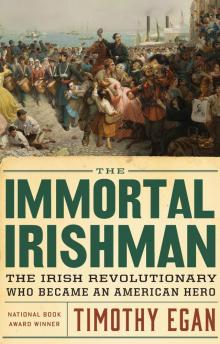 The Immortal Irishman
The Immortal Irishman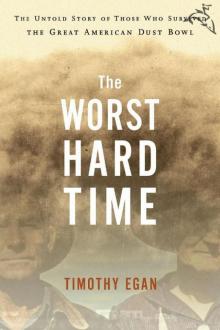 The Worst Hard Time: The Untold Story of Those Who Survived the Great American Dust Bowl
The Worst Hard Time: The Untold Story of Those Who Survived the Great American Dust Bowl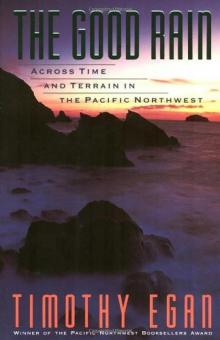 The Good Rain: Across Time & Terrain in the Pacific Northwest
The Good Rain: Across Time & Terrain in the Pacific Northwest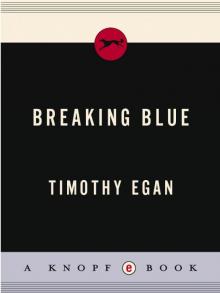 Breaking Blue
Breaking Blue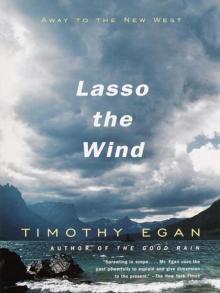 Lasso the Wind: Away to the New West
Lasso the Wind: Away to the New West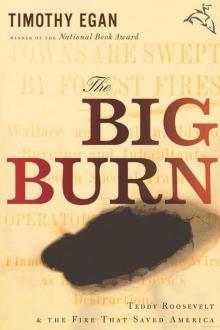 The Big Burn: Teddy Roosevelt and the Fire That Saved America
The Big Burn: Teddy Roosevelt and the Fire That Saved America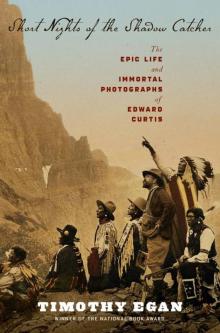 Short Nights of the Shadow Catcher
Short Nights of the Shadow Catcher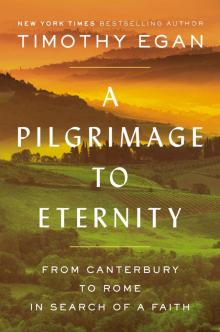 A Pilgrimage to Eternity
A Pilgrimage to Eternity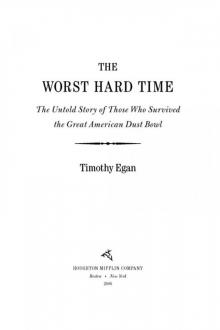 The Worst Hard Time
The Worst Hard Time The Big Burn
The Big Burn